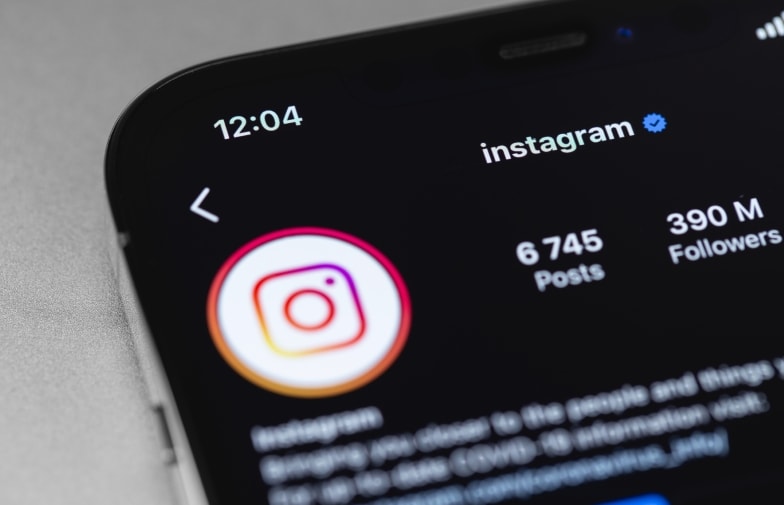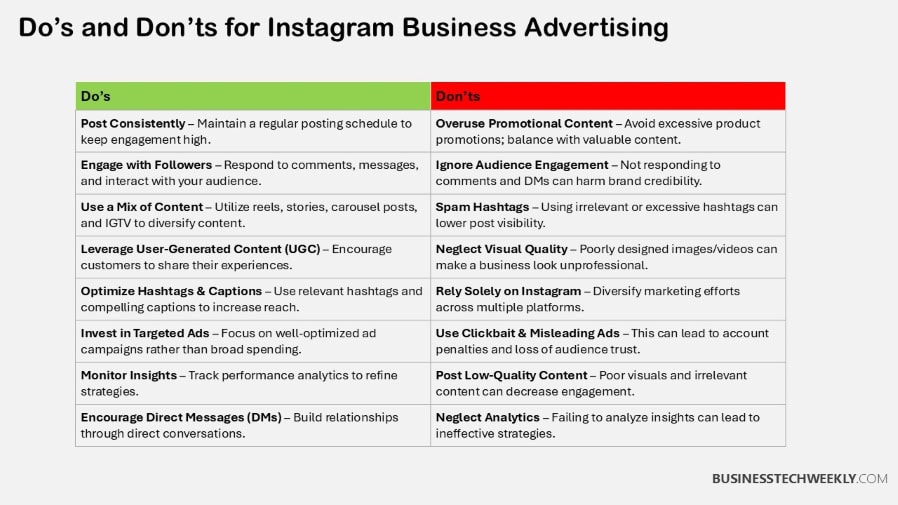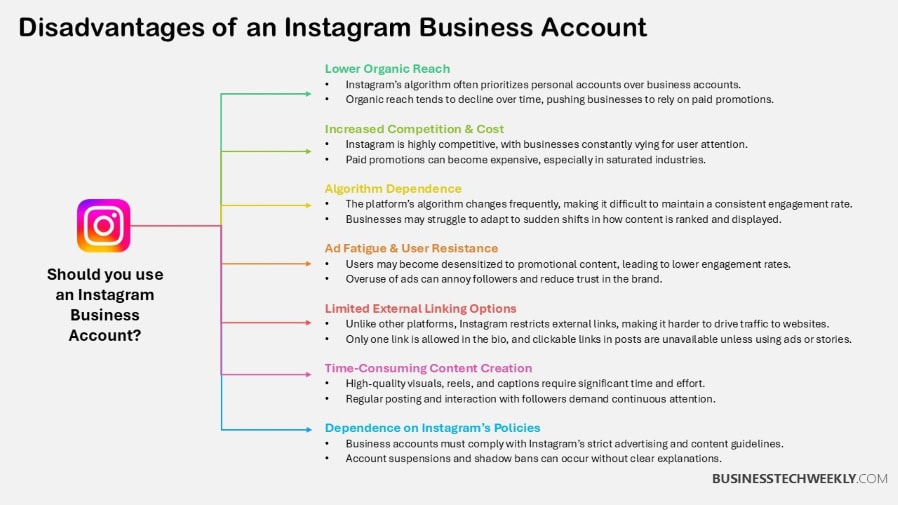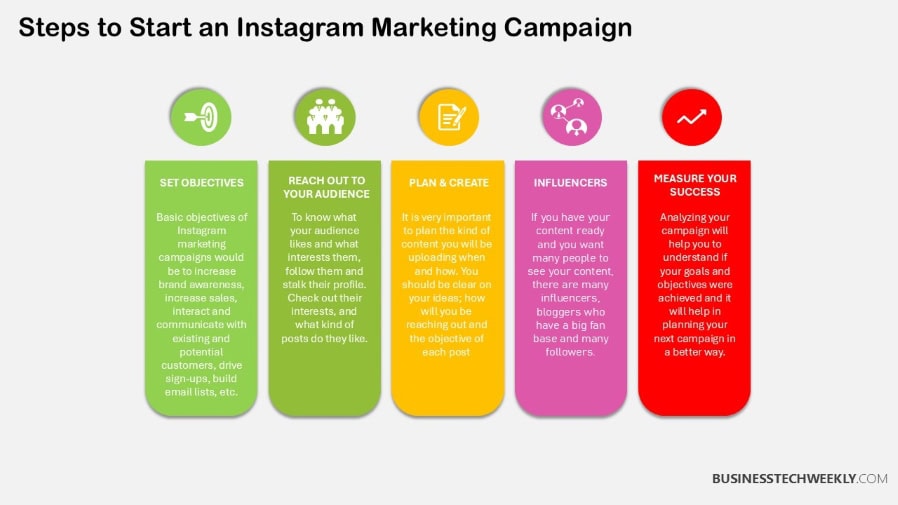Disadvantages of an Instagram Business Account

On this page:
Understanding Instagram Account Types
Each one serves specific functions that help them become useful Instagram accounts for various purposes.
A personal account is ideal for anyone looking to post about their everyday life and hobbies to a close group of friends. It offers a very chill vibe and you aren’t worried about metrics.
On the other hand, a business account is more geared towards brands that want to market their goods or services.
In addition, it’s loaded with analytical tools to provide insights into your audience and improve your marketing strategy. These insights increase your business’s engagement and efficiency by equipping you with data-driven tactics.
One of disadvantages of an Instagram business account is allegedly lower engagement rates upon making the switch to a Business account.
All marketers have seen the terrible decrease in Likes and engagement that follows as many users have reported, affecting marketing campaigns.+
Instagram Business accounts, though, have unmatched marketing potential through targeted advertising.
If you revert to a personal account, your data will be lost. For this reason, it’s important to consider the long-term advantages and disadvantages thoughtfully.
Here’s a quick comparison for clarity:
Feature |
Personal Account |
Creator Account |
Business Account |
|---|---|---|---|
|
Audience |
Friends & Family |
Influencers |
Brands |
|
Analytics |
Basic |
Advanced |
Advanced |
|
Engagement |
High |
Variable |
Often Lower |
|
Ads Access |
None |
Limited |
Full |
RELATED: Crafting an Effective Instagram Marketing Strategy

Disadvantages of Instagram Business Accounts
For many businesses, switching to an Instagram business account comes with an immediate, painful sting from a loss of organic reach.
Algorithms usually favor what is most personal, so businesses would suffer a loss of engagement. It’s little surprise then that countless users have seen their Likes disappear from hundreds down to a handful.
This change is always exasperating, especially when you’re just trying to get seen without having to pay per click. Increased competition is yet another obstacle.
As influencers and personal accounts flood the lines, competing to stand out becomes much more difficult.
Instagram’s advertising focus makes this even harder, since the platform’s whole purpose is to maximize profits through advertising by keeping users engaged.
Ads do play a part in the cluttered and chaotic user experience that Instagram has created. A common concern with business accounts is that you’ll lose your personality.
It’s more challenging to create authentic relationships, an important aspect of brand loyalty.
The absence of personal connection can give your operation a far-away feel.
Spam and irrelevant inquiries are two problems that are frequently cited.
All of these distractions get in the way of having the most direct and effective communication with your audience.
When we get to managing direct messages, it gets even a little difficult when you’re attempting to keep a quality conversation going. Just like with Reels and IGTV, there are drawbacks.
Business accounts get limited reel lengths and music options, even if they revert to personal accounts.
This kind of inflexibility stifles creative expression.

Comparing Business and Personal Accounts
When you look to compare business versus personal accounts, especially on Instagram, there are some pretty significant differences in engagement.
With business accounts, you often see a very sharp decline in engagement.
We’ve heard from many users who have seen their Likes drop from hundreds to a couple of dozen Likes.
This new shift signals to businesses a key opportunity and challenge to form a deeper connection with their audience.
There are financial considerations to running a business account.
You can increase your overall visibility, but often, you need to support that with paid advertising.
Instagram’s Ad Manager provides tools to track ad performance, simplifying data-driven decisions to improve performance.
While Instagram ads have the highest engagement of all platforms, the expense may be prohibitive for certain businesses.
Privacy issues come into play with business accounts. Automated data sharing with third-party tools can open the door to additional risks.
These accounts provide valuable, free information to help us all understand how audiences are behaving, but there is an inherent trade-off with privacy.
Here’s a quick rundown of the pros and cons:
- Access to Instagram Shopping and Ad Manager.
- Privacy issues and possible loss of engagement.
- More features like music on IGTV.
- Tao said very limited marketing intelligence and no direct sales generating mechanisms.

Should You Switch to a Business Account?
Switching to a business account on Instagram informs your audience that you’re intention is to sell.
It’s important to look beyond the shiny new features and understand whether these features align with your marketing objectives.
Instagram for Business has some great tools to assist, but keep in mind that selling is not really what Instagram is all about.
Without a doubt, promotion would be the number one goal for any brand on Instagram.
If your product is visual—meaning if it has a neat aesthetic or just photographs well—then Instagram is definitely calling your name. Its primary user base is Millennials and Gen Z, which makes it an excellent platform for brands looking to reach this audience.
Setting up a business account is not an overnight thing. Ask yourself if you have the time and staff to do it justice.
Building personal relationships with your followers is important, and switching to a business account can alter your ability to engage.
It’s no surprise, the platform has a high return on investment, boasting a conversion rate of 1.08%.
Remember too, that Instagram’s ads are expensive – averaging $0.70 to $1.00 cost-per-click. If you end up deciding it’s not the right move for you, you can always revert back to a personal profile.
Consider these advantages against the disadvantages and determine if a business account makes sense for your brand.
RELATED: Instagram Tips for E-commerce Businesses
Instagram Business Account Disadvantages: Key Points
You only want what is best for your business, and selecting the appropriate Instagram account type is an excellent place to start.
Business accounts provide all sorts of tools to help you strengthen your brand.
They provide you with tools like insights and analytics to figure out who your audience is and what your audience wants.
- By switching to a business account on Instagram, you’ll lower your organic reach due to the algorithm’s bias against business accounts. Think about whether this meshes with your visibility objectives.
- With the addition of personal accounts and influencers competing for user attention, Instagram’s algorithm can often make it difficult for your business to stand out. Consider what will make you unique.
- Business accounts can come off as overly formal, which can prevent you from making deeper, more authentic connections with your audience. Strike a balance between your business goals and the strategies for engagement that feel authentic.
- Just be ready for spam and other nonsense inquiries that waste a lot of time and communication effectiveness. Use filters and smart response techniques.
- Running a business account often requires investing in paid ads to boost visibility. Consider your budget and your ROI.
- Privacy concerns, particularly around data shared with third-party analytics tools, are increased with business accounts. Be sure to protect yourself and be aware of these dangers and disadvantages.
Frequently Asked Questions
What are the primary types of Instagram accounts?
Instagram has three main types: personal, business, and creator. Each one serves a distinct purpose.
Personal accounts are designed for regular, everyday users. Business accounts are valuable because they provide analytics and allow for ads. Creator accounts are focused on influencers, with dynamic follower demographic features.
What are the disadvantages of an Instagram business account?
Brands with Instagram business accounts can be penalized with less organic reach. Users will view your posts as advertisements.
On top of that, business accounts need to have a public profile, so there goes your privacy. They can invite more spammy DMs.
How do business and personal Instagram accounts differ?
Business accounts come with access to insights, the ability to run ads, and a contact button.
Personal accounts are all about connection and community, with an emphasis on personal privacy.
While business accounts are public, personal accounts can switch to private, which cuts off their visibility.
Should I switch to an Instagram business account?
Do it if you want detailed analytics or want to run ads. Instagram’s business accounts allow brands and creators to reach much larger audiences.
Do take a second to think about privacy and engagement changes.
Can I switch back to a personal account from a business account?
The good news is, yes, you can switch back to a personal account at any time. If that’s the case, it’s easy to switch back.
Simply navigate to settings, choose “Account,” then “Switch Account Type.” Be mindful that you will no longer have access to insights and ads.
Do Instagram business accounts cost money?
No, Instagram business accounts cost money. Unlike using Instagram organically, advertising on Instagram is not free.
The account itself comes with features such as insights and contact options at no additional cost.
Will switching to a business account affect my engagement?
Indeed, it just could. They will tell you that with a business account you will have a lower organic reach.
Users have been known to see posts from businesses as ads, which will in turn lower engagement rates.

